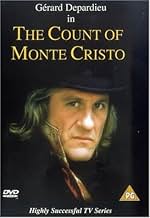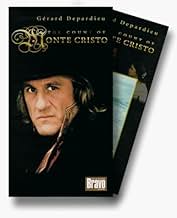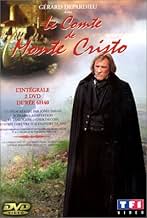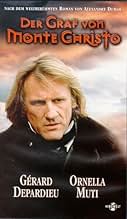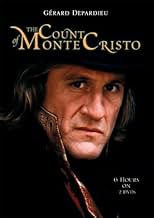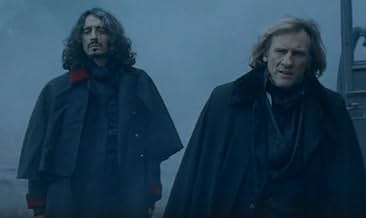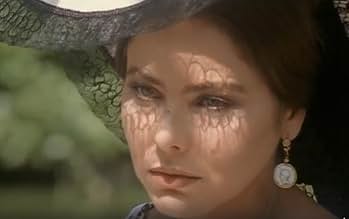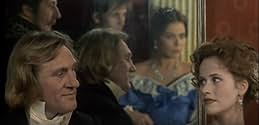VALUTAZIONE IMDb
7,8/10
7435
LA TUA VALUTAZIONE
Edmond Dantes viene ingiustamente mandato in prigione per diciotto anni. Fugge per reclamare la sua fidanzata Mercedes e vendicarsi della sua nemesi, Mondego.Edmond Dantes viene ingiustamente mandato in prigione per diciotto anni. Fugge per reclamare la sua fidanzata Mercedes e vendicarsi della sua nemesi, Mondego.Edmond Dantes viene ingiustamente mandato in prigione per diciotto anni. Fugge per reclamare la sua fidanzata Mercedes e vendicarsi della sua nemesi, Mondego.
- Premi
- 3 vittorie totali
Sfoglia gli episodi
Recensioni in evidenza
Alexander Dumas's immortal novel has been treated to many film and television adaptations, but until you watch the 1998 miniseries, you've never really seen it. If you've read the novel-I have an English-translated copy on my shelf-you know that it's impossible to condense every plot point into a two-hour movie, which is why the other adaptations have stuck to the main storyline and cut out the intricate plans of the title character. In this six-hour miniseries, it's almost like reading the book! And, since this is a French version, who else but the incomparable Gérard Depardieu could tackle the leading role?
From the opening scene, with Gérard's son Guillaume portraying him as a young man, you'll be purely captivated. To be brief, Guillaume is innocently involved in a treasonous plot, and before he can marry his sweetheart, Naike Rivelli, he's arrested, tried, and locked away in an Alcatraz-type prison on an island. Imprisoned for eighteen years, Guillaume becomes Gérard, and Gérard vows to escape and exact his revenge on those who did him wrong. Many people have cited the escape scene as their favorite, and it is incredibly exciting in this version. And, since this is a six-hour miniseries, Gérard's friendship with his fellow inmate, Georges Moustaki, isn't rushed like it sometimes is in other movies. Nothing is rushed in this adaptation, allowing the audience to understand every detail and complex plot point, and enjoy the execution of each scene.
How is it possible for Gérard Depardieu to be so wonderful? This role calls for so much, and some who've taken it on have been more successful than others. There's physical acting in addition to the highly dramatic scenes, a need to fit in to the time period, and the ability to take on many different disguises without being comical. Revenge, remorse, sympathy, determination, relief, and intelligence are just a few of the qualities the actor needs to embody. If he doesn't, he'll never convince the audience to root for him as he systematically ruins the lives of others. Gérard puts more of himself into this role than in any of the other thirty films I've seen. It's truly an experience to watch him in this miniseries. It feels that he, and not Alexandre Dumas, wrote the story, and that he, and not Josée Dayan, who directed the camera and his fellow actors to completely revolve around him. He is Edmond Dantès. His expressions are mesmerizing, and at times heartbreaking. He delivers his lines with such passion, understanding, and sensitivity, it's as if he's signed "Finis" in ink so that no other actor will bother to take on another remake.
Jean Rochefort and Pierre Arditi make the most of their deliciously villainous roles, and Ornella Muti plays the older version of Naike's role, Edmond Dantès's sweetheart. In a truly family affair, Gérard's daughter, Julie plays Ornella's daughter, and it's very cute to see their scenes together. You can practically feel his pride that both his children are acting alongside him in this masterpiece. Even if you're partial to the 1975 version, I recommend you watch this one. It's so much more thorough, it'll feel like a different story, so you won't be betraying Richard Chamberlain by liking both versions.
From the opening scene, with Gérard's son Guillaume portraying him as a young man, you'll be purely captivated. To be brief, Guillaume is innocently involved in a treasonous plot, and before he can marry his sweetheart, Naike Rivelli, he's arrested, tried, and locked away in an Alcatraz-type prison on an island. Imprisoned for eighteen years, Guillaume becomes Gérard, and Gérard vows to escape and exact his revenge on those who did him wrong. Many people have cited the escape scene as their favorite, and it is incredibly exciting in this version. And, since this is a six-hour miniseries, Gérard's friendship with his fellow inmate, Georges Moustaki, isn't rushed like it sometimes is in other movies. Nothing is rushed in this adaptation, allowing the audience to understand every detail and complex plot point, and enjoy the execution of each scene.
How is it possible for Gérard Depardieu to be so wonderful? This role calls for so much, and some who've taken it on have been more successful than others. There's physical acting in addition to the highly dramatic scenes, a need to fit in to the time period, and the ability to take on many different disguises without being comical. Revenge, remorse, sympathy, determination, relief, and intelligence are just a few of the qualities the actor needs to embody. If he doesn't, he'll never convince the audience to root for him as he systematically ruins the lives of others. Gérard puts more of himself into this role than in any of the other thirty films I've seen. It's truly an experience to watch him in this miniseries. It feels that he, and not Alexandre Dumas, wrote the story, and that he, and not Josée Dayan, who directed the camera and his fellow actors to completely revolve around him. He is Edmond Dantès. His expressions are mesmerizing, and at times heartbreaking. He delivers his lines with such passion, understanding, and sensitivity, it's as if he's signed "Finis" in ink so that no other actor will bother to take on another remake.
Jean Rochefort and Pierre Arditi make the most of their deliciously villainous roles, and Ornella Muti plays the older version of Naike's role, Edmond Dantès's sweetheart. In a truly family affair, Gérard's daughter, Julie plays Ornella's daughter, and it's very cute to see their scenes together. You can practically feel his pride that both his children are acting alongside him in this masterpiece. Even if you're partial to the 1975 version, I recommend you watch this one. It's so much more thorough, it'll feel like a different story, so you won't be betraying Richard Chamberlain by liking both versions.
Eight hours allows for a greater presentation of the many subplots and complexities of the storyline. Depardieu (once you get past his size) is excellent as the Count, a man who, as the reviewer from Amazon says, exchanges one prison for another, a prison of his own hatred. The cast is general is very good and convincing, with Ornella Muti certainly the definitive Mercedes. Set design and production values are excellent.
I have only two criticisms. The first and more minor one is that even this long adaptation doesn't have everything. They couldn't, of course, portray everything -- the book itself is well over 1,000 pages and in truth has padded sections -- but some worthwhile aspects of the story were cut, most notably early sequences with the Abbe Faria (who teaches Dante how to read and write) a very famous part that's usually included in dramatizations of the story. The ending, too, is happier than Dumas's. (I should add that some sequences were very sensibly cut).
A more serious criticism is that Dantes's character is too soft. Depardieu is a fine actor but his portrayal allows Dantes to come off far more sympathetic than I think Dumas intended. The coldness and bloodthirstiness of the Count is not emphasized as much as it might (one sequence at an execution has a very different spin from the way it's presented in the book, for example), nor is the extent of his hatred. This is a real flaw, partly because it makes light of the theme of the story, the effect of revenge on the revenger, and partly because the climax is not as effective if we're already on Dantes side. The flaw here is not with Depardieu, who does his job admirably, but rather with the screenwriter and director.
As such, I can't call this the definitive version -- a little more courage on the screenwriter and director's part would've done wonders. Still, it's probably the best we're going to get. It's hard to imagine anybody else lavishing this kind of care and attention on the story.
I have only two criticisms. The first and more minor one is that even this long adaptation doesn't have everything. They couldn't, of course, portray everything -- the book itself is well over 1,000 pages and in truth has padded sections -- but some worthwhile aspects of the story were cut, most notably early sequences with the Abbe Faria (who teaches Dante how to read and write) a very famous part that's usually included in dramatizations of the story. The ending, too, is happier than Dumas's. (I should add that some sequences were very sensibly cut).
A more serious criticism is that Dantes's character is too soft. Depardieu is a fine actor but his portrayal allows Dantes to come off far more sympathetic than I think Dumas intended. The coldness and bloodthirstiness of the Count is not emphasized as much as it might (one sequence at an execution has a very different spin from the way it's presented in the book, for example), nor is the extent of his hatred. This is a real flaw, partly because it makes light of the theme of the story, the effect of revenge on the revenger, and partly because the climax is not as effective if we're already on Dantes side. The flaw here is not with Depardieu, who does his job admirably, but rather with the screenwriter and director.
As such, I can't call this the definitive version -- a little more courage on the screenwriter and director's part would've done wonders. Still, it's probably the best we're going to get. It's hard to imagine anybody else lavishing this kind of care and attention on the story.
I like Gerard Depardieu, and I liked much of this movie. I am huge of the book, which provides amazing insight in human suffering, redemption, and revenge. The butchery of the script was benign relative to the recent Hollywood remake (a complete disaster - "It was a nice film about something, but it was not the Count of Monte Cristo."), but apparently the writer(s) could not resist temptation to alter the ending - which was particularly galling given the mostly faithful recreation of the book up to the point of the conclusion. I personally was bitter - you can't take a story of revenge and remake it into Harlequin romance novel. If you know the story, you know what they should have done, and you know what they probably did. Given the time investment in this movie to watch the whole thing, I literally could not believe it as it became apparent that the sell-out was going to happen. They were so close, and that just made the experience that much more sour.
Le Comte de Monte Cristo is well done. Actors are made for their roles. Gerard Depardieu is fabulous in the role of count and Sergio Rubini makes the servant Bertuccio alive. In the novel Bertuccio was in a much smaller role. In the TV-version other characters have got bigger roles. It's a good thing that not only the count of Monte-Cristo is showing. I really recommend this beautifully done TV-film for everyone. After seeing this I started to appreciate the French in the film world in a very different way.
I'm a big fan of the Alexandre Dumas story' Count of Monte Christo. The atmosphere in as well the book as the 2002 movie directed by Kevin Reynolds is fabulous!! Although in the 2002 movie I would have liked to see more detailed revenge plans, I really liked the part in which Edmond Dantes is educated by his visitor in jail Abbe Faria... In this miniseries the opposite is true.. it's absolutely fabulous in working out the part of revenge (so especially after you've watched the first 1/2 episodes, it gets great). Dantes teached by Faria is less more interesting in this miniseries.. which I think is logical since the French have a totally opposite view on what's interesting in comparison to the Americans. Gerard Depardieu acts great as le Comte le Monte Christo.. and this miniseries sticks better to the original story which I also like... One 2 Watch.. more than 1 time.. :-)
Lo sapevi?
- QuizGérard Depardieu also plays Edmond's father during the flashback scenes, where the young Edmond is played by his own son, Guillaume Depardieu.
- ConnessioniFeatured in Voyance et manigance (2001)
I più visti
Accedi per valutare e creare un elenco di titoli salvati per ottenere consigli personalizzati
- How many seasons does The Count of Monte Cristo have?Powered by Alexa
Dettagli
- Data di uscita
- Paesi di origine
- Sito ufficiale
- Lingua
- Celebre anche come
- The Count of Monte Cristo
- Luoghi delle riprese
- Aziende produttrici
- Vedi altri crediti dell’azienda su IMDbPro
Contribuisci a questa pagina
Suggerisci una modifica o aggiungi i contenuti mancanti

Divario superiore
By what name was Il conte di Montecristo (1998) officially released in India in English?
Rispondi

